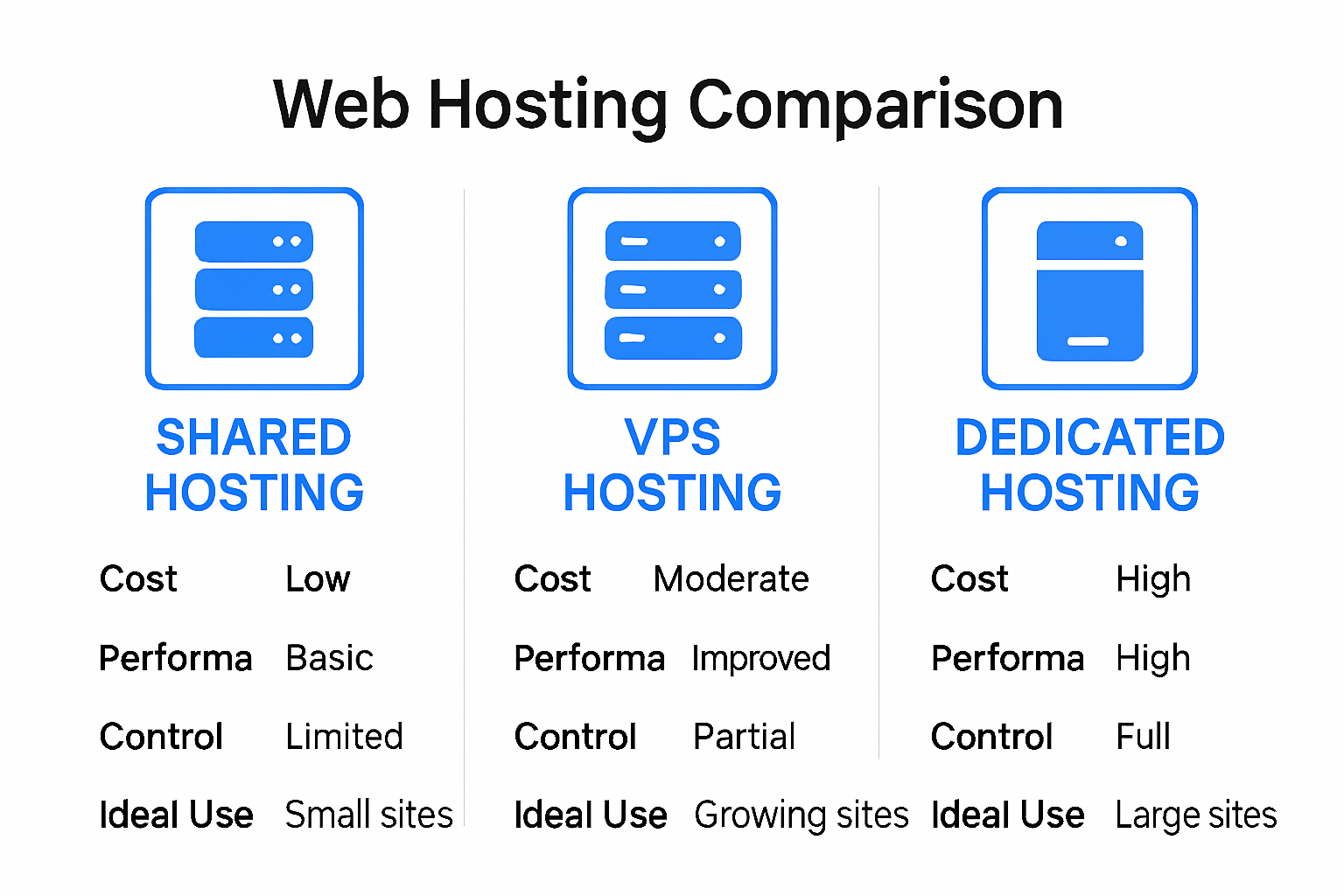Web Hosting Options Explained for Businesses in 2025
Every business website depends on web hosting to stay online, but not all hosting options are created equal. Shared, VPS, and dedicated solutions might sound similar, yet the difference can be huge— the web hosting market in Central and Western Europe is set to hit 46.74 billion dollars in 2025, growing at 13.47 percent each year . Here’s the real surprise. Picking the wrong hosting isn’t just about slower speeds or downtime. It can also hold back your business from reaching its true digital potential.
Table of Contents
- Types Of Web Hosting And How They Work
- Choosing The Right Hosting For Your Business
- Key Factors To Compare Web Hosting Providers
- Web Hosting Trends Impacting Digital Transformation
Quick Summary
| Takeaway | Explanation |
|---|---|
| Understand Hosting Types | Familiarize yourself with shared, VPS, and dedicated hosting to choose the best fit for your business needs, considering factors such as traffic volume and budget constraints. |
| Evaluate Business Requirements | Conduct a thorough assessment of your business’s technical requirements, including growth potential and security needs, to inform your hosting selection process. |
| Prioritize Performance and Security | When comparing web hosting providers, focus on uptime guarantees, server reliability, and robust security features to ensure optimal performance and data protection. |
| Stay Informed on Trends | Keep abreast of web hosting trends like cloud solutions and sustainability initiatives to remain competitive and align your hosting strategy with future digital needs. |
Types of Web Hosting and How They Work
Web hosting serves as the foundation for every business’s online presence, providing the essential infrastructure that makes websites accessible to users worldwide. Understanding the different types of web hosting is crucial for businesses seeking to optimize their digital strategy and ensure robust online performance.

Shared Hosting: The Entry-Level Solution
Shared hosting represents the most basic and cost-effective web hosting option for businesses and individuals just beginning their online journey. In this model, multiple websites coexist on a single physical server, sharing critical resources such as processing power, memory, and storage. According to Wikipedia , this approach significantly reduces individual hosting costs by distributing server expenses across multiple users.
The primary advantage of shared hosting lies in its affordability and simplicity. Small businesses, startups, and personal websites with moderate traffic can leverage this hosting type without substantial upfront investments. However, the shared nature comes with inherent limitations. Since resources are distributed among multiple websites, performance can be inconsistent. If one website experiences a traffic surge or consumes excessive resources, it might impact the performance of other sites on the same server.
Virtual Private Server (VPS) Hosting: Balanced Performance and Control
Virtual Private Server (VPS) hosting represents a significant step up from shared hosting, offering a more sophisticated and flexible solution for growing businesses. Research indicates that VPS hosting partitions a single physical server into multiple virtual servers, each with dedicated resources and isolated environments.
With VPS hosting, businesses gain greater control and predictability. Each virtual server operates independently, ensuring that the performance of one website does not directly impact others. This hosting type provides a dedicated allocation of CPU, RAM, and storage, allowing for more consistent and scalable performance. Medium-sized businesses and websites experiencing growth find VPS hosting particularly attractive because it offers a balance between affordability and enhanced capabilities.
Dedicated Hosting: Maximum Performance and Control
Dedicated hosting represents the pinnacle of web hosting solutions, providing an entire physical server exclusively for a single client. Expert analysis from Wikipedia suggests this option is best suited for large businesses, high-traffic websites, and organizations with complex technical requirements.
The primary benefits of dedicated hosting include complete server control, maximum performance, and enhanced security. Businesses can customize server configurations, install specific software, and optimize resources precisely to their needs. While significantly more expensive than shared or VPS hosting, dedicated hosting offers unparalleled reliability and performance for websites that cannot compromise on speed, security, or user experience.
Choosing the right web hosting solution depends on multiple factors, including your business size, website traffic, technical requirements, and budget. By understanding the characteristics of shared, VPS, and dedicated hosting, businesses can make informed decisions that support their digital growth and online success.
Before we move on, here’s a comparison table to help clearly distinguish the key features, benefits, and limitations of the main web hosting types discussed above:
| Hosting Type | Key Benefits | Typical Limitations | Best For |
|---|---|---|---|
| Shared Hosting | Most affordable, easy to use, low setup | Resource competition, limited performance | Small businesses, personal |
| VPS Hosting | Dedicated resources, scalable, flexible | Higher cost than shared, technical setup | Growing businesses, medium |
| Dedicated Hosting | Maximum performance, full control | Highest cost, requires expertise | Enterprises, large/complex |

Choosing the Right Hosting for Your Business
Selecting the appropriate web hosting solution is a critical decision that can significantly impact your business’s online performance, security, and growth potential. The right hosting strategy goes beyond mere technical considerations and directly influences user experience, search engine rankings, and overall digital competitiveness.
Assessing Your Business Needs and Technical Requirements
Before selecting a web hosting solution, businesses must conduct a comprehensive evaluation of their unique digital infrastructure requirements. Research from the European Commission reveals that by 2030, 75% of European businesses aim to integrate cloud-edge technologies, highlighting the strategic importance of thoughtful hosting selection.
Key factors to consider include website traffic volume, expected growth rate, computational resources needed, security requirements, and budget constraints. Small businesses with minimal traffic might find shared hosting sufficient, while enterprises with complex digital platforms will require more robust solutions like dedicated or cloud hosting. Performance metrics such as page load speed, uptime guarantees, and scalability potential should be carefully analyzed.
Cost-Effectiveness and Scalability Considerations
According to Statista , the web hosting market in Central and Western Europe is projected to reach $46.74 billion in 2025, with an annual growth rate of 13.47%. This growth underscores the dynamic nature of hosting solutions and the increasing importance of flexible, cost-effective infrastructure.
Businesses must balance immediate cost considerations with long-term scalability. While shared hosting offers the lowest initial investment, it may become restrictive as your digital presence expands. Virtual Private Server (VPS) hosting provides a middle ground, offering dedicated resources and room for growth without the substantial costs of fully dedicated servers. Cloud-based solutions increasingly offer pay-as-you-go models, allowing businesses to adjust resources in real-time based on demand.
Security and Compliance Factors
In an era of increasing digital threats and stringent data protection regulations, hosting security cannot be an afterthought. Data from the European Commission indicates that 45% of EU businesses already utilize cloud computing services, with large enterprises showing higher adoption rates.
When evaluating hosting options, prioritize providers offering robust security features such as SSL certificates, regular automated backups, DDoS protection, and compliance with regional data protection standards like GDPR. For businesses handling sensitive customer information, dedicated or private cloud hosting might provide the necessary security layers.
Ultimately, choosing the right web hosting solution requires a strategic approach that aligns technical capabilities with business objectives. By carefully evaluating traffic needs, budget constraints, scalability potential, and security requirements, businesses can select a hosting environment that not only supports current operations but also facilitates future digital growth and innovation.
Key Factors to Compare Web Hosting Providers
Selecting the right web hosting provider is a critical decision that can significantly impact your business’s online performance, security, and digital strategy. With numerous options available in 2025, businesses must develop a comprehensive approach to evaluating potential hosting partners beyond surface-level considerations.
To clarify the main criteria covered in this section, see the table below which summarizes critical web hosting provider evaluation metrics and typical features to look for:
| Evaluation Factor | What to Look For | Key Details/Features |
|---|---|---|
| Performance & Reliability | 99.9%+ uptime, fast server response, low latency | Proximity to audience, network redundancy |
| Security & Compliance | SSL, firewalls, malware scanning, backup, GDPR | Automated backups, DDoS, compliance standards |
| Customer Support | 24/7 assistance, live chat, expert techs, fast response | Multi-channel, clear SLAs |
| Scalability | Resource upgrades, pay-as-you-go options | Flexible plans, cloud-enabled features |
Performance and Reliability Metrics
Research from MIT Technology News emphasizes the critical importance of reliability in web hosting selection. Businesses should prioritize providers offering a minimum uptime guarantee of 99.9%, which directly translates to consistent website availability and optimal user experience.
Key performance indicators extend beyond simple uptime. Businesses must assess server response times, bandwidth capabilities, and scalability potential. Look for hosting providers that offer transparent performance metrics, including:
- Server Location : Proximity to target audience can significantly reduce latency
- Hardware Specifications : Quality of servers and infrastructure
- Network Redundancy : Backup systems to prevent potential service interruptions
Security and Compliance Considerations
According to Holicky Corporation , security has become a paramount concern for businesses selecting web hosting providers. Modern hosting solutions must provide comprehensive security features that protect against evolving digital threats.
Essential security elements to evaluate include:
- SSL Certificates : Encryption for data transmission
- Automated Backup Systems : Regular and secure data preservation
- Firewall Protection : Advanced threat detection and prevention
- Malware Scanning : Continuous monitoring and removal of potential security risks
Support and Technical Assistance
CyberPanel research highlights the critical role of customer support in web hosting selection. Businesses should seek providers offering comprehensive, multi-channel support that ensures rapid resolution of technical issues.
Ideal customer support characteristics include:
- 24/7 Availability : Round-the-clock technical assistance
- Multiple Communication Channels : Live chat, email, phone support
- Technical Expertise : Knowledgeable support staff familiar with complex hosting environments
- Response Time Guarantees : Clear commitments for issue resolution
Choosing a web hosting provider is more than a technical decision. It represents a strategic partnership that can significantly influence your business’s digital capabilities. By methodically evaluating performance, security, and support metrics, businesses can select a hosting solution that not only meets current requirements but also supports future digital growth and innovation.
Web Hosting Trends Impacting Digital Transformation
Web hosting has evolved from a simple infrastructure service to a critical enabler of digital transformation, driving innovation and competitive advantage for businesses across various sectors. Understanding emerging trends is essential for organizations seeking to leverage technological advancements and maintain a robust digital presence.
Cloud-Driven Hosting Ecosystems
Research from the European Commission highlights the strategic importance of digital transformation, with public administration increasingly adopting data-driven technologies. Cloud hosting has become a pivotal trend, offering businesses unprecedented flexibility, scalability, and cost-efficiency.
Cloud-based hosting solutions enable businesses to dynamically adjust computational resources based on real-time demand. This approach eliminates traditional infrastructure limitations, allowing companies to scale operations seamlessly. A study on the French market indicates that cloud services positively impact firm growth rates, with smaller firms experiencing particularly significant benefits. By democratizing advanced technological capabilities, cloud hosting helps mitigate industry concentration and supports digital innovation across company sizes.
Decentralization and Regional Hosting Strategies
Comprehensive research reveals fascinating insights into hosting industry dynamics. Currently, one-third of global domains are hosted by five US-based providers, demonstrating significant centralization. However, an interesting countertrend emerges in country-code top-level domains (ccTLDs), where local providers predominantly manage hosting infrastructure.
This trend toward regionalization reflects growing concerns about data sovereignty, privacy regulations, and the need for localized digital experiences. Businesses are increasingly considering hosting providers that offer:
- Geographical Data Proximity : Reducing latency and improving user experience
- Compliance with Local Regulations : Ensuring adherence to regional data protection standards
- Enhanced Security Frameworks : Leveraging region-specific cybersecurity protocols
Sustainability and Green Hosting Technologies
Environmental considerations are rapidly transforming web hosting strategies. Modern businesses recognize that digital infrastructure’s carbon footprint is substantial, driving demand for sustainable hosting solutions. Hosting providers are responding by developing energy-efficient data centers, implementing renewable energy strategies, and offering carbon-neutral hosting options.
Key sustainability trends in web hosting include:
- Renewable Energy Powered Data Centers : Utilizing solar, wind, and hydroelectric resources
- Advanced Cooling Technologies : Reducing energy consumption in server infrastructure
- Carbon Offset Programs : Compensating for computational energy requirements
Digital transformation is no longer just about technological capability but about creating responsible, adaptable, and efficient digital ecosystems. Web hosting has transformed from a purely technical service to a strategic component of business innovation. By understanding and embracing these emerging trends, organizations can develop hosting strategies that not only meet current technological requirements but also position them for future digital success.
Frequently Asked Questions
What are the main types of web hosting available for businesses?
The main types of web hosting for businesses include shared hosting, Virtual Private Server (VPS) hosting, and dedicated hosting. Shared hosting is cost-effective but limited in resources. VPS hosting offers more control and dedicated resources, while dedicated hosting provides maximum performance and security with an entire server for a single client.
How do I choose the right web hosting for my business?
To choose the right web hosting, assess your business needs such as website traffic volume, growth potential, technical requirements, and budget. Consider performance, security, and scalability, and analyze how each hosting type aligns with your specific needs.
What factors should I consider when comparing web hosting providers?
When comparing web hosting providers, consider performance and reliability metrics like uptime guarantees and server response times. Additionally, evaluate their security features, customer support availability, and scalability options to ensure they meet your business’s requirements.
How is cloud hosting impacting businesses in 2025?
Cloud hosting is providing businesses with unprecedented flexibility and scalability, allowing them to adjust resources in real-time based on demand. It helps businesses avoid traditional infrastructure limitations and is increasingly seen as a cost-effective solution that supports digital transformation.
Transform Your Hosting Insights Into Digital Success
Struggling to turn web hosting choices into real business growth? The article above highlights just how crucial it is to align your hosting with your digital strategy. Maybe you are worried about downtime affecting your customers or concerned that your platform cannot scale as your business grows. Slow-loading pages and the risk of missed sales are real challenges. At TRAVLRD we understand what is at stake because we help businesses like yours bridge the gap between complex hosting options and seamless online performance every day.

Ready to move beyond confusion and build a future-proof online presence? Discover how our custom digital solutions and innovative web development approach can help you maximize every opportunity your website offers. Visit TRAVLRD to view real case studies and client feedback, then request your free consultation. Start building a digital foundation that not only supports your current needs but also positions your business for competitive growth now.







